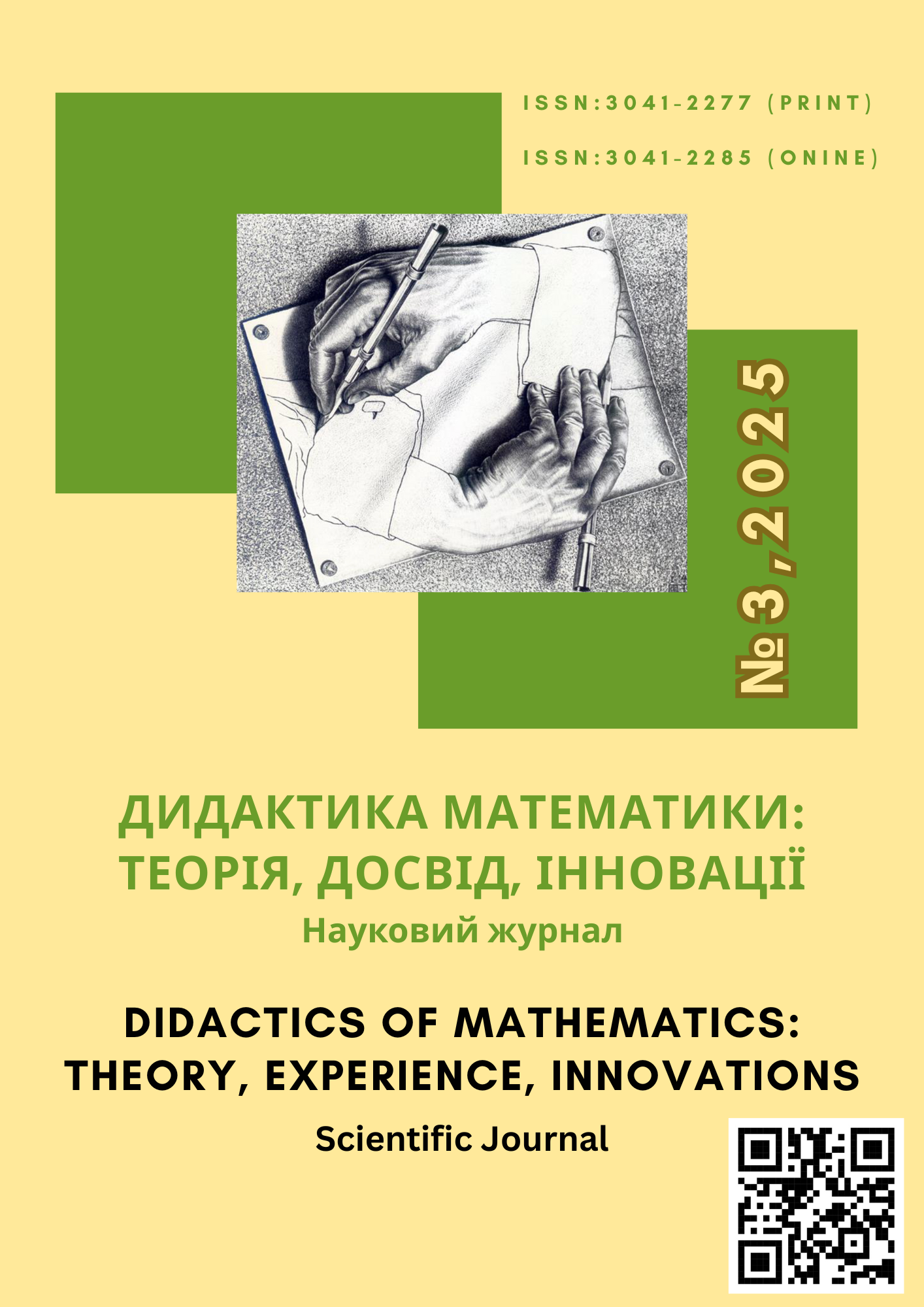The role of mathematics in the training of future economists: a view from foreign researchers
https://doi.org/10.31652/3041-2277-2025-3-77-92Published 2025-07-15
Keywords
- mathematical training,
- future economists,
- the role of mathematics in economics education,
- challenges in mathematics education,
- factors for improving mathematics training
Copyright (c) 2025 Наталія Підліснича

This work is licensed under a Creative Commons Attribution 4.0 International License.
How to Cite
Abstract
The article analyzes publications by foreign researchers from Argentina, Norway, the United Kingdom, the United States, Spain, Uzbekistan, the Netherlands, Germany, Mexico, Italy, and France, published between 2017 and 2024. The study identifies the role of mathematics in the training of future professionals in the field of economics. Mathematics is shown to be essential for understanding the modern economy. A well-designed integration of mathematical and economic content in the training of future economists allows for a deeper and more meaningful comprehension of both subjects. In the process of mastering economic disciplines, the mathematical apparatus plays a fundamental role, as mathematical knowledge and skills form the basis for economic learning. Mathematical literacy is a key factor in improving national productivity and competitiveness. Successful mathematical training positively influences the performance of future professionals. Even relatively small improvements in the mathematical skills of a country's workforce can have a significant positive impact on long-term economic growth and national well-being. The study highlights current international approaches to improving the mathematical training of future economists. Notably, essential elements of such improvements abroad include the use of modern pedagogical strategies in mathematics education (such as problem-based and inquiry-based learning), effective integration of digital technologies, emphasis on critical thinking development, teaching of mathematical proofs and modeling, as well as consideration of emotional factors in the learning process.
Downloads
References
- Agbata, B.C., Obeng-Denteh, W., Abraham, S., Asante-Mensa, F., Kwabi, P.A., Okpako, S.O., Amoah-Mensah, J., & Arivi, S.S. (2024). Advancing Mathematics Education in Africa: Challenges, Strategies, and Prospects. Science World Journal, 19(3), 808–818. https://dx.doi.org/10.4314/swj.v19i3.28
- Biehler, R., Durand-Guerrier, V., & Trigueros, M. (2024). New trends in didactic research in university mathematics education. ZDM – Mathematics Education, 56(7), 1345–1360. https://doi.org/10.1007/s11858-024-01643-2
- Darlington, E., & Bowyer, J. (2017). Students’ views of A-level Mathematics as preparation for degree-level economics. Citizenship, Social and Economics Education, 16(2), 100-116. https://doi.org/10.1177/2047173417716423
- Di Martino, Pietro. (2024). Attitudes in Mathematics Education. https://doi.org/10.1142/9789811287183_0028.
- Esparza Masana, R., & Márquez Cebrián, D. (2024). The role of mathematics in students’ performance in economics and business undergraduate courses. SSRN. https://doi.org/10.2139/ssrn.4776559
- Ida Landgärds-Tarvoll (2024) Understanding the challenges of the secondary-tertiary transition in mathematics for economics in higher education: a literature review. Teaching Mathematics and its Applications: An International Journal of the IMA, Volume 43, Issue 4, Pages 251–272, https://doi.org/10.1093/teamat/hrad011
- Nazarov, X. A. (2024). Methodical Approach to Teaching Mathematics for Economists. American Journal of Applied Science and Technology, 4(06), 9–13. https://doi.org/10.37547/ajast/Volume04Issue06-03
- Opstad, L. (2018), «Success in business studies and mathematical background: the case of Norway», Journal of Applied Research in Higher Education, Vol. 10 No. 3, pp. 399-408. https://doi.org/10.1108/JARHE-11-2017-0136
- Pepin, Birgit & Buchholtz, Nils & Salinas-Hernández, Ulises. (2025). A Scoping Survey of ChatGPT in Mathematics Education. Digital Experiences in Mathematics Education. 11. 9-41. 10.1007/s40751-025-00172-1.
- Rotherham, Andrew J.; Willingham, Daniel T. (2025) «21st-Century» Skills: Not New, but a Worthy Challenge American Educator, v34 n1 p17-20 Spr 2010 American Federation of Teachers. 555 New Jersey Avenue NW, Washington, DC 20001. Web site: http://www.aft.org/newspubs/periodicals/ae
- Ulpetbaeva, S. A. Q. (2025). Integration of information technologies into teaching mathematics for economists. International Journal Of Management And Economics Fundamental, 5(2), 20-22. https://doi.org/10.37547/ijmef/Volume05Issue02-05
- Velma Benítez, Verónica Parra, Teaching mathematics for economists: partial results of the implementation of a study and research path, Teaching Mathematics and its Applications: An International Journal of the IMA, Volume 43, Issue 4, December 2024, Pages 383–403, https://doi.org/10.1093/teamat/hrae024
- Матяш, О. І., & Гусак, Л. П. (2005). Математика і підготовка фахівців економічних спеціальностей: навчально-методичний посібник. [Mathematics and the training of specialists in economic fields: A teaching and methodological manual]. Вінниця. 118 с.
- Матяш, О., & Риндюк, В. (2023). Навчання математики з використанням цифрових навчальних платформ: аналіз закордонного досвіду. Фізико-математична освіта, 38(3), 43–49. https://doi.org/10.31110/2413-1571-2023-038-3-006
- Підліснича, Н. Г. (2016). Аналіз закордонного досвіду математичної підготовки майбутніх економістів [Analysis of foreign experience in mathematical training of future economists]. Наукові записки. Серія: Проблеми методики фізико-математичної і технологічної освіти, (10, Ч. 1), 77–85.
- Шульга, Н. В. (2014). Стохастична підготовка майбутніх економістів у навчальних закладах Німеччини [Stochastic training of future economists in educational institutions of Germany]. Педагогічні науки: теорія, історія, інноваційні технології, (5[39]), 427–439.

